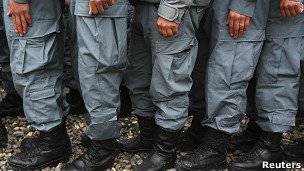Afghan police: corruption, heroin and tea boys
 BBC reporter Ben Anderson spent five weeks with the US Marines serving as advisers to the Afghan security forces in Helmand province. During this trip, on the instructions of the BBC TV program Panorama, which deals with investigative journalism, he was faced with numerous cases of corruption and crime in the ranks of Afghan law enforcement officers.
BBC reporter Ben Anderson spent five weeks with the US Marines serving as advisers to the Afghan security forces in Helmand province. During this trip, on the instructions of the BBC TV program Panorama, which deals with investigative journalism, he was faced with numerous cases of corruption and crime in the ranks of Afghan law enforcement officers.The police are close to their abductions, corruption, drugs, murder and crimes against children. But in the Sangin area - the most dangerous point in Afghanistan - some policemen are not investigating these crimes, but are committing.
Politicians rant that the transfer of responsibility for providing security to the Afghan forces is proceeding smoothly and they are quite ready to cope with this task after the NATO contingent leaves the country.
Having recently visited Helmand, British Defense Secretary Philip Hammond said that "the transfer [of powers] is going very well - according to plan." "Afghans are acquiring the necessary skills faster than we expected, and we have every reason to believe that they will be able to provide security after the withdrawal of international forces," he said.
And the outgoing commander of NATO troops, General John Allen, is overwhelmed with enthusiasm: "Afghan forces protect the Afghan people and allow the government of the country to serve its citizens. This is a victory. That is success, and don't be shy to say such big words."
The reality in Sangin, however, looks very different.
I spent five weeks with the American marines, who took the baton from British troops in 2010 here, in southern Afghanistan. I hoped to get an idea of how successfully the Afghan forces were able to prepare to take responsibility for this region.
Marijuana and heroin
During my business trip to Sangin, only two units from the 18 Marines were deployed each time every few days to train the Afghan army and police.
The rest of the US military rarely leave their main base.
Due to the growing danger of sabotage by the militants who have penetrated the ranks of the Afghan forces — green-on-blue attacks, as they are called — the Americans live completely separate from their Afghan allies. Entering the Afghan base, the Americans are holding weapon on alert.
When traveling outside the unit, marines from the United States also see a far from rosy picture. At one of the checkpoints, Afghan soldiers openly smoked marijuana. The two policemen who were assigned to reinforce the observation tower with sandbags obviously used something more successful - perhaps heroin or opium.
When three weeks after my departure one of them was wounded, an American medic found a bag of heroin in his pocket.
Corruption instead of salary
Major Bill Stoyber leads a group of police advisers and spends a lot of time at its headquarters, interacting with high Afghan police officers.
According to him, the scope of corruption is impressive. He compared the situation with the Clan Soprano mafia TV series: “The scale is enormous — from stealing ammunition to fuel theft. ".
He says police sometimes sell ammunition and weapons at the local bazaar - including rocket launchers. Thus, the weapons whose supplies were paid for by the Allied forces could well fall into the hands of the Taliban.
One of the fortified patrol posts was declared unsafe for a stay - because the Afghan police had taken them apart and sold it for scrap to armored plates.
Major Stoiber says that foreign military advisers, given local circumstances, have to confront themselves with limited tasks and not to forget that sometimes the Afghan police simply cannot work without corruption. Many cops simply cannot live on their salaries, he explains.
“If we cut off all their corruption schemes, the police would lose all effectiveness,” admits Bill Stoyber.
The problem of "tea boys"
However, the major acknowledges that there are things that need to be waged an uncompromising struggle - for example, with the sexual abuse of police officials in respect of minors.
In all the police stations of Sangin, where I have been, I met teenagers — some were armed, others looked like servants. They are called here "tea boys". According to Stoiber, they are often sexually exploited.
The problem is widespread. While I was in Sangin, four such teenagers were shot while trying to escape from the police, three of them died as a result. None of the policemen involved were arrested.
“Try to work this way every day with child abusers, robbers, murderers. Over time, it becomes harder to endure,” the American major admits.
The Afghan authorities say they are fighting corruption, and that the police and army are ready to take full responsibility for the security of the country.
But I myself saw that corruption and crime had deep roots in the Sangin police. It was this practice that led many Afghans to meet the Taliban with open arms in the 1996 year. Was it really for the sake of war and blood was shed?
- with the BBC
- http://www.bbc.co.uk/russian/international/2013/02/130225_corrupt_afghan_police_panorama.shtml
Information